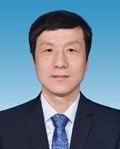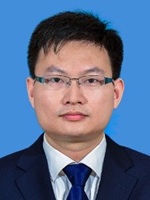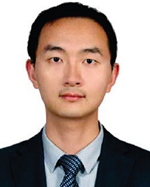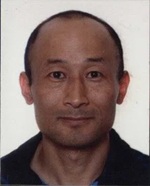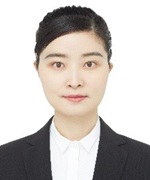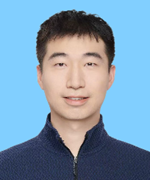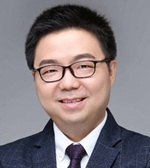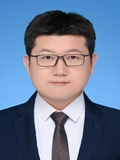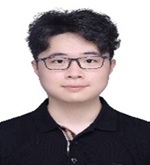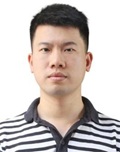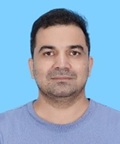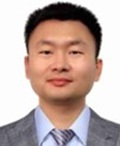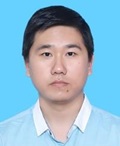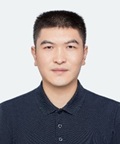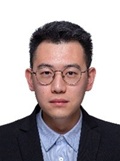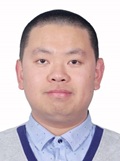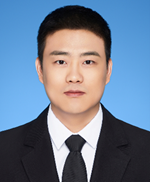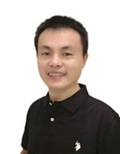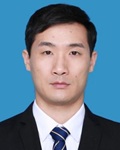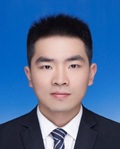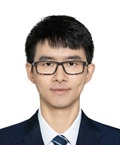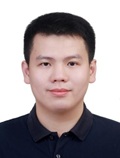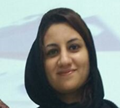Invited Speakers
|
Prof. Youping ZHAO, Beijing Jiaotong University, China Speech Title: Blockchain-Enabled Three-Dimensional Radio Environment Map (REM) for Space-Air-Ground Integrated Network Spectrum Assessment Youping Zhao received the B.S. and M.S. degrees from Tsinghua University, Beijing, China, in 1994 and 1996, respectively, and the Ph.D. degree from Virginia Tech, Blacksburg, Virginia, USA, in 2007. He is currently a Professor with Beijing Jiaotong University, Beijing. His research interests include blockchain-based spectrum management for space-air-ground integrated networks, channel characterization, radio environment map (REM)-enabled cognitive radio and intelligent communications for the next-generation wireless communications. |
|
Prof. Peiyan Yuan, Henan Normal University, China Peiyan Yuan is a professor of Computer Science, a PhD supervisor, and the dean of computer and information engineering school at the Henan Normal University. He was elected as the Pingyuan Scholar in 2022 and the Young Scholar of Henan Province in 2019. He is the distinguished member of CCF, the senior memeber of IEEE, and the associate editor of EURASIP Journal on Wireless Communications and Networking, and Journal of Big Data, respectively. His research interests include future networks and distributed systems, and he authored or coauthored more than senventy papers and two books in these fields. He received three Best Paper Awards. Three projects are granted by the NSFC and more than ten projects are granted by the Department of Education, Department of Science and Technology of Henan Province. |
|
Prof. Xin Yang, Northwestern Polytechnical University, China Yang Xin received his B. Eng. and M. Eng., in communications engineering from Xidian University in 2011 and 2014. Then he received Ph.D. degrees in communications engineering from Northwestern Polytechnical University in 2018. Currently he is a professor majored in information and communication engineering of Northwestern Polytechnical University. His research interests include wireless communication networks and protocol design. |
|
Prof. Yingyi Yang, China Southern Power Grid Technology Co., Ltd., China Speech Title: A Review of AI Applications for Intelligent O&M in Power Grid: Current Research and Development Trends Yingyi Yang received his Ph. D. degree from South China University of Technology (SCUT) and his B.S. and M.A. degrees form University of Electronic Science and Technology of China (UESTC). Currently he is the team leader of the artificial intelligence application technology in the electric power industry. He is also a member of the Institute of Electrical and Electronics Engineers (IEEE) and a senior member of the Chinese society for electrical engineering (CSEE). His current research interests include intelligent systems, terminals and algorithms with their applications. |
|
Assoc. Prof. Jiaxin Zhang, Beijing University of Posts and Telecommunications, China Speech Title: Mega Constellation Network Routing: Exploring Efficient and Reliable Inter-Satellite Communication Paths Dr. Jiaxin Zhang received the B.S. (2012) and Ph.D. (2017) degrees from Beijing University of Posts and Telecommunications (BUPT), Beijing, China. He is currently an Associate Professor with the School of Information and Communication Engineering, BUPT. His research interests include 6G networks, integrated satellite–terrestrial networks, non-terrestrial networks (NTN), and mobile edge computing. Dr. Zhang received the IEEE WCSP 10-year Anniversary Excellent Paper Award (2009–2019) and the IEEE Trust Com Outstanding task Award 2021. |
|
Assoc. Prof. Shushan Zhao, Central Connecticut State University, USA Speech Title: A Security Vulnerability and Its Remedies in E-commerce Shushan Zhao received his BSc degree in Computer Science and Engineering from Shandong University, and MSc degree in Computer Science and Engineering from Helsinki University of Technology. He completed his PhD degree in Computer Science from School of Computer Science, University of Windsor in 2012. Before joining Central Connecticut State University, he taught at Vanier College, Bishop’s University and University of Pittsburgh (Bradford Campus). Also having worked as a software developer at VMWare, Mavenir, Ericsson, and Nuance, he has rich experience in telecommunication and software industry. |
|
Assoc. Prof. Yaqiong Liu, Beijing University of Posts and Telecommunications, China Speech Title: Communication-Sensing-Computation Integration Oriented Joint Optimization of Latency and Energy Consumption in Internet of Vehicles Yaqiong Liu is currently an Associate Professor with School of Information and Communication Engineering, Beijing University of Posts and Telecommunications. She received her PhD’s degree from Nanyang Technological University, Singapore in 2016. Her research interests include internet of vehicles, artificial intelligence, and spatial information communication. She is an IEEE Senior Member, Member of Internet of Vehicle Professional Committee in China Institute of Communications, Senior Member of China Institute of Communications, TPC Member of IEEE ICCC 2018/2019/2020/2021/2022 and BigData 2024/2025, and serves as a reviewer for multiple leading journals (e.g., IEEE Trans. Commun., IEEE Trans. Wirel. Commun., IEEE Trans. Netw. Serv. Manag., IEEE Trans. Veh. Technol., IEEE Wireless Commun., IEEE Commun. Mag., IEEE Internet of Things J., etc.). She has won tens of awards, such as the First Prize in National University Electronic-Information Young Teacher Teaching Sills Competition, and the First Prize of the Science and Technology Award of China Communication Society, etc. |
|
Assoc. Prof. Yi Zhao, Chang’An University, China Speech Title: Principle and Key Applications of Diffusion Generative Models Dr. Associate Prof. Yi Zhao received the M.Eng. degree from Pierre and Marie Curie University (Sorbonne University), France, in 2010 and the Ph.D. degree from the University of Toulon, France, in 2013. He has been with the School of Electronics and Control Engineering, Chang’An University since 2014. His research interests include Computer vision, Image Processing, Reinforcement learning and intelligent control systems. He has been an Active Reviewer of more than 30 journals and conferences and Technical Committee Member/Session Chair for over 20 IEEE/ IET/ACM conferences since 2012. |
|
Assoc. Prof. Hongwei WANG, University of Electronic Science and Technology of China, China Speech Title: Near/Far-Field Channel Estimation For Millimeter wave/Terahertz Systems With ELAAs: A Block-Sparsity-Aware Approach Hongwei Wang received the B.S. and Ph.D. degrees from Northwestern Polytechnical University, Xi’an, China, in 2013 and 2019, respectively. From December 2019 to July 2024, he was a Post-Doctoral Researcher with the University of Electronic Science and Technology of China, where he is currently an Associate Professor. His research interests include statistical signal processing, compressed sensing and sparse theory, and mmWave/THz wireless communications. |
|
Research Fellow, Feng Wang, Singapore University of Technology and Design (SUTD), Singapore Speech Title: Breaking Snapshot Barrier: Graph-Based Learning for Reliable NTN Mobility Management Feng Wang received the B.S. and Ph.D. degrees from University of Electronic Science and Technology of China (UESTC) in 2016 and 2022, respectively. He is currently a Research Fellow with Information Systems Technology and Design Pillar at the Singapore University of Technology and Design (SUTD), Singapore. His research interests include non-terrestrial networking (NTN), satellite mobility management, and NTN service orchestration. He was a keynote speaker at SIMUtools 2020 and a tutorial speaker at ICCT 2024, 2025. He received the Best Paper Award at SIMUtools 2019. He has orgnized multiple NTN-related symposia and workshops at international conferences. He served as a Guest Editor of Electronics and is currently a member of Youth Editorial Board of Journal of Information and Intelligence (JII). |
|
Assoc. Prof. Xiaojun Hei, Huazhong University of Science and Technology, China Xiaojun received the B.Eng degrees in Information Engineering from Huazhong University of Science and Technology, Wuhan, P.R. China. He also obtained his MPhil. Degree in Electrical and Electronic Engineering from the Hong Kong University of Science and Technology. Then, he received his Ph.D. degree in the Department of Electronic and Computer Engineering at the Hong Kong University of Science and Technology. Starting from October 2008 till now, he has joined the School of Electronic Information and Communications, Huazhong University of Science and Technology, P.R. China. He is now an associate professor in the School of Electronic Information and Communications, Huazhong University of Science and Technology. Between September 2005 and September 2007, he worked on P2P networking in the Department of Computer and Information Science, Polytechnic University. He is co-author (with Yong Liu and Keith W. Ross) of the best paper in multimedia communications for 2008 by the Multimedia Communications Technical Committee of the IEEE Communications Society. He has been an internationally certified ISW facilitator since Jan. 2021. His current research interests include Artificial Intelligence Enabled Networking, Intelligent Healthcare, Robotic Applications. |
|
Assoc. Prof. Peng Chen, Southeast University, China Peng Chen (Senior Member, IEEE) was born in Jiangsu, China, in 1989. He received the B.E. and Ph.D. degrees from the School of Information Science and Engineering, Southeast University, Nanjing, China, in 2011 and 2017 respectively. From March 2015 to April 2016, he was a Visiting Scholar with the Department of Electrical Engineering, Columbia University, New York, NY, USA. He is currently an Associate Professor with the State Key Laboratory of Millimeter Waves, Southeast University. His research interests include target localization, super-resolution reconstruction, and array signal processing. He is a Jiangsu Province Outstanding Young Scientist. He has served as an IEEE ICCC Session Chair, and won the Best Presentation Award in 2022 (IEEE ICCC). He was invited as a keynote speaker at the IEEE ICET in 2022. He was recognized as an exemplary reviewer for IEEE WCL in 2021, and won the Best Paper Award at IEEE ICCCCEE in 2017. |
|
Assoc. Prof. Danyang Zheng, Southwest Jiaotong University, China Danyang Zheng received the B.S. degree in computer science from the University of Electronic Science and Technology of China, Chengdu, China, in 2016, and the Ph.D. degree in computer science from the Georgia State University (fully sponsored by China Scholarship Council for four years), Atlanta, GA, USA, in 2021. He is currently an Associate Professor at Southwest Jiaotong University, China. His research interests include network function virtualization, network reliability and security, in-network computation, and AI on Networks. He is on the editorial board of Big Data Mining and Analytics. He was/is the Publicity chair of WCCCT 2025-2026, ICCC 2024-2025, the Track chair of WCCCT 2024, ICCC 2025, and IEEE ICNC 2025-2026, and served as TPC member of IPCCC 2025, WCCCT 2023-2025, ICCC 2021-2025, IEEE ICTC 2023, IEEE VTC 2023, and IEEE ICCT 2023. He is also serving as the Skill Competition Manager (SCM) for Software Testing in the coming WorldSkill Shanghai 2026. |
|
Assoc. Prof. Jing Yang, Guizhou University, China Speech Title: Computing Task Scheduling Across Regions with Cloud-Edge-End Collaboration Dr. Yang is a Postdoctoral at Shanghai Jiao Tong University and a former joint-training Ph.D. scholar at OSU. Recognized for his significant research impact, he was named among the "World's Top 2% Most Influential Scientists" in 2025. His primary research interests lie at the intersection of data science, multi-modal fusion sensing, and edge computing.He actively contributes to the academic community, serving in roles such as Executive Committee Member of the CCF Technical Committee on Distributed Computing and Systems and Youth Research Fellow of the China Association for Science and Technology. As a research team leader at Guizhou University, he has spearheaded multiple national and provincial research projects. His scholarly output includes over 50 SCI publications, 36 authorized invention patents, and contributions to the development of national and industry standards. His work has been honored with several prestigious awards, including the Science and Technology Progress Award from the Ministry of Education.He is also an active participant in the international academic community, having served on the Technical Program Committee for conferences including IEEE ICCC and as a reviewer for numerous top-tier international journals. |
|
Assoc. Prof. Lanhua Xia, Hangzhou Dianzi University, China Lanhua Xia is an associate professor in Hangzhou Dianzi Univ. Her research interest includes communication system design for deep space applications and Design-For-Test in key RF modules in deep space systems. She has led 2 projects funded by the National Natural Science Foundation of China and 2 projects funded by Zhejiang Province. She published more than 20 papers in IEEE TAES, IEEE TCAS2, ACTA Astronautica, IET Circuits Devices & Systems, and granted more than 10 patents in recent years. She served as TPC member and session chair of the IEEE ICCC for four consecutive sessions from 2021 to 2024, and as organizing committee of the IEEE ICFIT in 2024. She is also a committee member of Chinese Association for Artificial Intelligence (CAAI). |
|
Assoc. Prof. Bo Li, Ningxia University, China Dr. Li is an associate professor in the School of Electronics and Electrical Engineering, Ningxia University, China. He received his Ph.D. degree in Information and Communication Engineering from Beijing University of Posts and Telecommunications (BUPT) in 2012. And he did Postdocal research from 2015 to 2017 at EEC, the University of Florida, USA. His main research interests include B5G/6G, Space-Air-Ground Integrated Network Architecture, Network Function Virtualization and Software Definition, Green Communication and Energy Efficiency, Integration of Communication and Energy networks, and Resource management for future communication. He serves in several reviewer boards for several international conferences and journals. Dr. Li has served as the Chair of IEEE ICCT and ICCC. |
|
Assoc. Prof. Bhai Nhuraisha I. Deplomo, University of Makati, Philippines Engr. Bhai Nhuraisha I. Deplomo serves as the Founder of EROVOUTIKA Electronics, Robotics, and Automation. She holds a license in Electronics and Communication Engineering, having earned her Bachelor's degree (BSECE) with Distinction and Best in Journalism Award from the University of Mindanao - Cotabato. During her undergraduate years, she excelled as the Editor-In-Chief of the school publication, and academic excellence award. Her academic journey continued with the successful completion of a Master's degree in MSEcE (MS in Electronics Engineering) from Mapua University and an MSICT (MS in Information and Communication Technology) from Pamantasan ng Lungsod ng Maynila (PLM). Additionally, she pursued her Doctor of Technology (academic units earned) at TUP-Manila. Currently, she is in the final stages of completing her PhD in Electronics Engineering at Mapua University, focusing on her dissertation. With a wealth of experience, Engr. Bhai Nhuraisha I. Deplomo has been actively involved in numerous Robotics and Automation projects. She holds the position of Associate Professor at the University of Makati, contributing to the academic field with her expertise and dedication. |
|
Assoc. Prof. Bo Zhang, Tianjin Normal University, China Bo Zhang, Ph.D., is an Associate Professor and the Vice Dean of the College of Electronic and Communication Engineering / College of Artificial Intelligence at Tianjin Normal University. He received his Ph.D. from The University of Sheffield, UK, in 2018. As a Master's supervisor, his primary research interests include array signal processing, integrated sensing and communication (ISAC) design, and Simultaneous Wireless Information and Power Transfer (SWIPT). |
|
Assoc. Prof. Chao Fang, Beijing University of Technology, China Chao Fang received his B.S degree in Information Engineering from Wuhan University of Technology, Wuhan, China, in 2009, and the Ph.D. degree with the State Key Laboratory of Networking and Switching Technology in Information and Communication Engineering from Beijing University of Posts and Te4lecommunications, Beijing, China, in 2015. He joined the Beijing University of Technology in 2016 and now is an associate professor. From August 2013 to August 2014, he had been funded by China Scholarship Council to visit Carleton University, Ottawa, ON, Canada, as a joint doctorate. Moreover, he is the visiting scholars of University of Technology Sydney, Commonwealth Scientific and Industrial Research Organization, Hong Kong Polytechnic University, Kyoto University, Muroran Institute of Technology, and Queen Mary University of London. Dr. Fang is the senior member of IEEE, and the vice chair of technical affairs committee in IEEE ComSoc Asia/Pacific Region (2022-2023). Moreover, he served as the Technical Program Committee Chair of SPCNC 2024, the Session Chairs of ICC 2015, ICCC 2023, and WCNC 2024, Workshop Chairs of ICFEICT (2022-2024) and ICNCIC (2023-2024), and Poster Co-Chair of HotICN 2018. He won the Best Paper Award of IEEE ICFEICT 2022 and 2024, ICCSN 2024, and NCIC 2024. His current research interests include future networks, intelligent cloud-edge-terminal cooperation computing, and intelligent network control. |
|
Assoc. Prof. Emanuel S. Grant, University of North Dakota, USA Emanuel S. Grant received a B.Sc. from the University of the West Indies, MCS from Florida Atlantic University, and a Ph.D. from Colorado State University, all in Computer Science. Since 2008, he is an Associate Professor in the Department of Computer Science (August 2002 – June 2018) and the School of Electrical Engineering and Computer Science (June 2018 – present) at the University of North Dakota, USA, where he started as an Assistant Professor in 2002. He currently serves as the Associate Director of the School of Electrical Engineering and Computer Science (SEECS) and SEECS Graduate Program Director. His research interests are in software development methodologies, formal specification techniques, domain-specific modeling languages, model-driven software development, software engineering education, and ethics for software engineering. Emanuel Grant has conducted research in software engineering teaching with collaborators from Holy Angel University, Philippines; HELP University College, Malaysia; III-Hyderabad, India; Singapore Management University, Singapore; Montclair State University, and University of North Carolina Wilmington of the USA; and the University of Technology, Jamaica. He is affiliated with the SEMAT (Software Engineering Method and Theory) organization, as a member of the Essence - Kernel and Language for Software Engineering Methods (Essence) group. Emanuel is a member of the Association for Computing Machinery (ACM), Upsilon Pi Epsilon (UPE), and the Institute of Electrical and Electronics Engineers (IEEE). |
|
Assoc. Prof. Gong Chen, Chengdu University of Information Technology, China GONG CHEN received the B.S. degree in electronic engineering from University of Electronic Science and Technology of China (UESTC), in 2005, the M.S. degree in Information, Production and Systems (IPS) from the Waseda University, Japan, in 2010, and the Ph.D. degree in Integrated circuits and systems from the Kitakyushu University, Japan, in 2013. During 2013-2016, he joined the the Advanced Semiconductor Research Institute, Panasonnic, Osaka, Japan. In 2018, he completed a research assignment from IPS at Waseda University. Since 2018, he has been a Chair of the Microelectronic Department, Chengdu University of Information Engineering, Chengdu, China. His current research interests include physics, analog and mixed-signal electronics, and their joint feasibility aspects. He has authored or co-authored about 25 papers and holds six patents. |
|
Assoc. Prof. Liwei Yang, China Agricultural University, China Dr. Liwei Yang, associate professor of China Agricultural University. She received the B.E. degree in Telecommunication Engineering from Chongqing University of Posts and Telecommunications, China, and the Ph.D. degree in Information and Communications Engineering from Beijing University of Posts and Telecommunications, China. From 2009 to 2011, she was a Postdoctoral Research Fellow with the Department of Electronic Engineering, Tsinghua University, China. In 2015, she joined the faculty of the College of Information and Electrical Engineering, China Agricultural University. Her research interests include optical networks, optical wireless communications and visible light communication. She participated in a number of national projects and published more than 100 papers. She served as a TPC member of several international academic conferences and a reviewer for several international journals. |
|
Assoc. Prof. Qian Xu, Northwestern Polytechnical University, China Qian Xu is an Associate Professor of Electronics and Information at Northwestern Polytechnical University, Xi’an, China. She received the B.S. and Ph.D. degree from Xi'an Jiaotong University in 2014 and 2021, respectively. From October 2018 to October 2019, she was a Visiting Student with Henry Samueli School of Engineering, University of California at Irvine, Irvine, CA, USA. Prof. Xu’s research lies in the general areas of physical layer security, UAV communications, and AI enabled resource optimization. Her most relevant contributions have ranged from the security-enhanced transmission design of communications systems, constructive interference based precoding, integrated sensing and communications, and reconfigurable intelligence surface aided communications system. Prof. Xu’s work has led to 30+ publications in leading journals and conferences in the field. She serves as the TPC member of IEEE/CIC International Conference on Communications in China and also the editor of Unmanned Systems Technology. She received the support of Young Talent Fund of Association for Science and Technology in Shaanxi, China, 2024. |
|
Assoc. Prof. Salabat Khan, Qilu Institute of Technology, Jinan, China Speech Title: Pseudonym Authentication and Revocation in Vehicular Public Key Infrastructure for Secure Cooperative Intelligent Transportation Systems Salabat Khan received a Ph.D. in Computer Science and Technology from the Beijing Institute of Technology, Beijing, China. He was a Postdoctoral Fellow (2020-2022) with the College of Computer Science and Software Engineering, Shenzhen University, China. Afterward, Dr. Khan worked as an Associate Researcher (Associate Professor Research) with the College of Computer Science and Software Engineering. He is an Associate Professor in the School of Computer and Information Engineering, Qilu Institute of Technology, China. He has published over 60 research articles in various highly reputable journals, including IEEE Communications Surveys and Tutorials, IEEE Transactions on Intelligent Transportation Systems, IEEE Transactions on Vehicular Technology, and IEEE Transactions on Mobile Computing. His research interests include security and privacy, VPKI, PKIX, cryptographic algorithms, blockchain, and distributed ledger technologies. |
|
Assoc. Prof. Xiaoqiang Hua, National University of Defense Technology, China Xiaoqiang Hua is an associate professor of the National University of Defense Technology. He received the PhD degrees in information and communication engineering from National University of Defense Technology, Changsha, China, in 2018. His research interests lie in the areas of information geometry, statistical signal processing, radar target detection. |
|
Assoc. Prof. Xin Nie, Wuhan Institute of Technology, China Xin Nie holds a Ph.D. in Computer Software and Theory from Wuhan University. He is currently an Associate Professor at the School of Computer Science and Engineering, Wuhan Institute of Technology, focusing on cutting-edge research in Software Engineering and Artificial Intelligence. He has extensive experience in software R&D, particularly in the field of integrated electronic information systems. He has published numerous high-quality academic papers and holds several patents and software copyrights. He is actively involved in academic organizations such as IEEE, CCF, and CAAI, and serves on the editorial boards and committees of various international conferences and journals. His research interests include Intelligent Optimization Algorithms, Evolutionary Computation, Cloud Computing, Machine Learning, and Deep Learning. |
|
Assoc. Prof. Yingtao Niu, National University of Defense Technology, China Speech Title: Coping with Unknown Jamming: Reflections on Intelligent Anti-Jamming Communications Yingtao Niu received the Ph.D. degree from the Institute of Communication Engineering, PLA University of Science and Technology, China, in 2008. He is currently an Associate Professor at National University of Defense Technology (NUDT), Nanjing, China. He has authored more than 100 journal and conference papers. His main research interests include signal processing in wireless communication, cognitive radio theory and techniques, with particular emphasis on algorithms of anti-jamming communication and intelligent algorithm in wireless systems. |
|
Assoc. Prof. Chengzong Peng, Chengdu University of Information Technology, China Speech Title: Security-aware Sub-chain Embedding and Protection in Edge Networks Chengzong Peng, Ph.D., Associate professor, IEEE member, CCF member. His research focuses on network reliability, cyberspace security, and artificial intelligence. He has published over 30 SCI/EI papers, including IEEE INFOCOM, IEEE TNSM, IEEE IoTJ, and Computer Networks. He is currently leading/working on multiple national and provincial-level scientific research projects, and horizontal research projects. He is serving as the TPC of ICNC 2025, and has served as the Session Chair of WCCCT 2024, and the Talk Chair of ACM TURC 2024. He has also served as a reviewer for multiple well-known international academic journals and conferences, such as Big Data Mining and Analytics, Expert System with Applications, and Computer Network. |
|
Assoc. Prof. Kefeng Guo, Nanjing University of Aeronautics and Astronautics, China Speech Title: Reliable Covert Communication for NOMA-based Satellite Networks Under Interference Constraint Kefeng Guo received his B.S. degree from Beijing Institute of Technology, Beijing, China in 2012, and the Ph.D. degree in Army Engineering University, Nanjing, China in 2018. He is an associate professor in the College of Electronic and Information Engineering, Nanjing University of Aeronautics and Astronautics. He has authored or coauthored nearly 100 research papers in international journals and conferences. His research interests focus on cooperative relay networks, MIMO communications systems, multiuser communication systems, satellite communication, hardware impairments, cognitive radio, NOMA technology and physical layer security. He was a recipient of exemplary Reviewer for IEEE Transactions on Communications in 2022. He was the recipient of the Outstanding Ph.D. Thesis Award of Chinese Institute of Command and Control in 2020. He also was the recipient of the Excellent Ph.D. Thesis Award of Jiangsu Province, China in 2020. He was the recipient of the Best Paper Award of WiSATS 2024. He was listed in the World's Top 2% Scientists identified by Stanford University in 2022-2024. He also serves as an Editor on the Editorial Board for the EURASIP Journal on Wireless Communications and Networking and IEEE Open Journal of the Communications Society. Dr. Guo has been the TPC member of many IEEE sponsored conferences, such as IEEE ICC, IEEE GLOBECOM and IEEE WCNC. |
|
Assoc. Prof. Haohao Ren, University of Electronic Science and Technology of China, China Haohao Ren is an associate professor of University of Electronic Science and Technology of China. From 2020 to 2021, he was a visiting Ph.D. student in the department of computer science and information engineering, University of Trento, Italy. His research interests include signal processing, image interpretation, and deep learning. He has been served as a Guest Editor for the Remote Sensing, a Youth Editor for Journal of Modern Radar, and also served as Editor for Journal of China Electronics Science and Technology Academy. Moreover, he also served as the chair of the workshop of the International Conference on Optical Engineering, Sensing and Instruments (2025).He has authored more than over 40 papers in some journals and conferences such as IEEE TGRS, IEEE TAES, IEEE JSTARS, RS, SP, IGARSS, IRC,etc. |
|
Asst. Prof. Shuai Wang, University of Electronic Science and Technology of China, China Speech Title: Beyond ADMM: A Unified Client-Variance-Reduced Adaptive Federated Learning Framework Shuai Wang received the PhD degree from the School of Science and Engineering, The Chinese University of Hong Kong, Shenzhen, China, in 2021. He is currently an assistant professor at the University of Electronic Science and Technology of China. Before that, he was a postdoctoral research fellow with the Information Systems Technology and Design Pillar, Singapore University of Technology and Design, Singapore. His current primary research interests include optimization algorithms for signal processing, machine learning and communication systems, distributed optimization and federated learning (FL), data security and privacy protection in distributed systems, integrated sensing and communication (ISAC), etc. He has published more than 30 academic papers and serves as the Youth Editorial Board Member of two journals, and the session chair of ICCT 2025. |
|
Asst. Prof. Farhan Amin, Gachon University, South Korea Farhan Amin received the M.S. degree in computer science from International Islamic University Islamabad (IIUI), in August 2012, and the Ph.D. degree from the Department of Information and Communication Engineering, College of Engineering, Yeungnam University, Gyeongsan, South Korea, in October 2020. He was an Assistant Professor with the Department of Computer Engineering, Gachon University, South Korea. He is currently working as an Assistant Professor with the Department of Computer Science Engineering, Yeungnam University, Gyeongsan, South Korea. He has over 12 years of teaching and research experience. His research interests include the Internet of Things, Social Internet of Things, Big data, and Data science. He was a recipient of a fully funded scholarship for master’s and Ph.D. studies. He is a member of IEEE and ACM. |
|
Asst. Prof. Xiangyi Chen, Southwest Jiaotong University, China Speech Title: Decentralized Bilevel Learning for Vehicular Twin Migration Xiangyi Chen, Ph.D., Assistant Professor. Her research interests include multi-access edge computing, edge intelligence, artificial intelligence, federated learning, and deep reinforcement learning. She has published numerous SCI-indexed journal and conference papers in high-impact academic venues such as IEEE Journal on Selected Areas in Communications (JSAC), IEEE Transactions on Mobile Computing (TMC), IEEE Internet of Things Journal (IoTJ), IEEE Systems Journal (SJ), and IEEE Global Communications Conference (GLOBECOM). She has led several research projects, including the China Postdoctoral Science Foundation, the Natural Science Foundation of Sichuan Province, and the Fundamental Research Funds for the Central Universities. She also participates in national-level programs such as the National Key R&D Program of China and the National Natural Science Foundation of China (NSFC). She serves as a TPC member for the 23rd IEEE International Conference on Ubiquitous Computing and Communications (IEEE IUCC 2024 Workshop), and acts as a reviewer for leading international journals including IEEE Transactions on Mobile Computing (TMC), IEEE Transactions on Wireless Communications (TWC), IEEE Transactions on Network Science and Engineering (TNSE), IEEE Transactions on Vehicular Technology (TVT), IEEE Internet of Things Journal (IoTJ), and IEEE Network. |
|
Dr. Yan Li, University of Electronic Science and Technology of China, Chengdu, China Speech Title: Unlimited Sampling based Integrated Sensing and Communication system Li Yan, Lecturer. She earned her Ph.D. from the University of Electronic Science and Technology of China, during which she was jointly Ph.D at the University of Alberta in Canada. After obtaining her doctorate, she worked for seven years at Huawei Technologies Co., Ltd., focusing on millimeter-wave-related algorithms and hardware design. She completed the fault tolerance theory and tape-out of an independently designed chip end-to-end, which was published in the journal JSSC for circuit design. In early 2024, she joined the University of Electronic Science and Technology of China as a lecturer, primarily engaged in teaching and research related to millimeter-wave sensing and communication integration, as well as low-power high-reliability hardware architecture. She has participated in or led multiple enterprise projects on sensing and communication integration, including those by China Mobile and Datang, as well as national key projects. Under her guidance, students won the second prize in the National Graduate Electronic Design Competition Final in 2024. She has published over 20 academic papers and applied for/invented more than 6 patents. |
|
Dr. Wei Jiang, German Research Center for Artificial Intelligence (DFKI), Germany Speech Title: Heterogeneous Massive MIMO: A Cost-Efficient Technique for Uniform Service in Cellular Networks Wei Jiang is a senior researcher with the German Research Center for Artificial Intelligence (DFKI), the largest European AI research institution and the birthplace of the "Industry 4.0" strategy. He authored two monographs: "6G Key Technologies: A Comprehensive Guide" (Wiley & IEEE Press, 2023) and "Cellular Communication Networks and Standards: The Evolution from 1G to 6G" (Springer, 2024). With over 100 papers and approximately 30 granted patents, he has been involved in numerous EU and German research projects. He serves as an editor for IEEE Access (2019-2023), IEEE Communications Letters, and IEEE Open Journal of the Communications Society. He was a member of the organizing or technical committees for conferences including IEEE ICASSP 2022, CCS 2014, PIMRC 2015/2020, GLOBECOM 2022/2023/2024, ICC 2023/2024, WCNC 2024, and ICCC 2017/2021/2022/2023. He was also a founding member and vice chair of the IEEE TCCN special interest group "Cognitive Radio in 5G." |
|
Dr. Nanxi Li, China Telecom Research Institute, China Dr. Nanxi Li, Senior Engineer, China Telecom Research Institute 6G Research Center. He received his Ph.D. degree from Beijing University of Posts and Telecommunications in 2018. He has been with China Telecom Research Institute since then, working on 5G standardization in 3GPP RAN1 and 6G promising techniques including reconfigurable intelligent surface. He is the rapporteur for the 3GPP Rel-18 further NR coverage enhancements work item. He has submitted 200 technical papers to 3GPP, invented/co-invented about 130 filed/granted Chinese patents, published 20 academic papers and co-authored 1 book. |
|
Dr. Abdul Hayee Shaikh, Southern University of Science & Technology, China Speech Title: Generic Constraint-Free Design of Sparse MIMO System for Enhanced Localization of Targets Abdul Hayee Shaikh received a PhD in Communication and Information Systems in 2023. He then joined the Southern University of Science and Technology (SUSTech), Shenzhen, China, as a visiting scholar. Currently, he is working as a postdoc fellow in the School of Microelectronics at SUSTech, where he has been awarded the President's Excellent Postdoctoral Fellowship. He has published over 10 SCI articles as the first author and has several co-authored publications. His research interests include array signal processing, MIMO radar, and wireless communications technology. |
|
Dr. Cen Wang, KDDI Research, Inc., Japan Cen Wang, IEEE/OSA member, graduated from Beijing University of Posts and Telecommunications and received electrical engineering doctoral degree in 2019. He then joined KDDI Research, Inc., Japan, in 2020, as a core researcher of optical communication and network. He started research in natural language processing assisted network automation in 2023, the related works were selected as highly scored paper in OFC 2023, and invited presentation in ECOC 2024. |
|
Dr. Lufeng Yuan, Beijing China-Power Information Technology Co.,Ltd., China Lufeng Yuan is a senior engineer at State Grid Corporation of China. He received his PhD degree of computer science from the Institute of Computing Technology, Chinese Academy of Sciences, Beijing in 2017. As a big data expert of State Grid Corporation of China, he works in power informatization and digitalization. He has published more than 10 papers and written 2 books. His research interests mainly focus on Big data, artificial intelligence and digital twins. |
|
Dr. Maryam Cheraghy, Wenzhou-Kean University, China Speech Title: Machine Learning-Driven Wireless Resource Allocation: SVM-Based Factor Graph Design in SCMA Networks Dr. Maryam Cheraghy obtained her PhD in Communication and Information Engineering from Shanghai Jiao Tong University. She joined the Broadband Access Network Laboratory during her PhD studies. She also received her Master's degree from Huazhong University of Science and Technology, China, in 2014. She joined the Computer Science department in 2022 and is currently working as a lecturer at Wenzhou-Kean University. Dr. Cheraghy serves as an Editorial Board member/reviewer for IEEE Transactions on Vehicular Technology (TVT) and IEEE Communication Letters, as well as for various IEEE Conferences. With about 14 years of experience in the telecommunications industry, she has been involved in projects such as NSFC and Huawei company. Her research interests include B5G/6G Wireless Communication, Reconfigurable Intelligent Surfaces, and AI/Machine Learning. |
|
Dr. Qi Liu, Shanghai Jiao Tong University, Shanghai, China Speech Title: Self-Correcting-Guided Generalized Framework for Small-Sample PV Fault Diagnosis Qi Liu received the B.Eng. degree from the College of Information Science and Engineering, Northeastern University, Shenyang, China, in 2019, and the Ph.D. degree in control science and engineering from Shanghai Jiao Tong University, Shanghai, China, in 2024. He is currently a Research Associate with the Department of Automation, Shanghai Jiao Tong University, Shanghai, China. His current research interests include machine learning, fault diagnosis, intelligent operation and maintenance of photovoltaic system. He has served as the Session Chair of IEEE ICCC 2024. |
|
Dr. Weiwei Jiang, Beijing University of Posts and Telecommunications, China Speech Title: AI-Native 6G Networks: An Overview Dr. Weiwei Jiang received the B.Sc. and Ph.D. degrees from the Department of Electronic Engineering, Tsinghua University, Beijing, China, in 2013 and 2018, respectively. He is currently an assistant professor with the School of Information and Communication Engineering, Beijing University of Posts and Telecommunications, and Key Laboratory of Universal Wireless Communications, Ministry of Education. His current research interests include artificial intelligence, machine learning, big data, wireless communication and edge computing. He has published more than 60 academic papers in IEEE Trans and other journals, with more than 4000 citations in Google Scholar. He is one of 2023 and 2024 Stanford's List of World's Top 2% Scientists. |
|
Dr. Yan Li, University of Nottingham Ningbo China Speech Title: Research on the Implementation of Algorithmic Thinking and Sentiment Analysis by Applying the Knowledge System Based on Named Entity Recognition Models and Relationship Mapping Models Yan Li, a researcher at the University of Nottingham Ningbo China, IEEE Senior Member, IET Fellow, UK Advanced HE Principal Fellowship, CEng. Yan has published over 20 academic papers, holds 2 invention patents. Yan published a chapter in the monograph named "Emotions in Code - The AI Frontier of Sentiment Analysis" in 2025. She serves on the editorial board of multiple artificial intelligence journals, such as the American Journal of Artificial Intelligence, as well as on the editorial boards of several important international and domestic academic conferences. Her main research areas include computational intelligence, neural networks, machine learning, sentiment analysis, named entity recognition, and knowledge engineering. |
|
Dr. Yikang Chen, China Southern Power Grid, China Chen Yikang, Ph.D., Senior Engineer. The research directions are: submarine cable operation and maintenance technology, intelligent unmanned equipment development, computer simulation and communication technology. Together with the third-level leading professional technical expert in the submarine cable direction of China Southern Power Grid UHV Company, the specialist in submarine cable equipment management of Haikou Branch Submarine Cable Management Department, a candidate for the Hainan South China Sea Famous Young Project, and a candidate for the Special Support Program for high-level talents of China Southern Power Grid, he has won 4 provincial and ministerial-level awards and 4 municipal-level awards. Contact person for the submarine cable direction of the "Joint Laboratory for DC Transmission Equipment and Safe Operation of Submarine Cables" of the China Southern Power Grid Company's Joint Innovation Laboratory, and the first contact person of the world's largest International Submarine Cable Protection Technology Organization (ICPC). Participated in the compilation of 1 national standard, 1 industry standard and 3 enterprise standards. The first author has published 2 SCI papers, 7 EI papers and 1 core Chinese paper. 35 authorized patents (14 invention patents and 1 international patent); Published three monographs. |
|
Dr. Yueting Li, Beihang Univeristy, China Li Yueling, Senior Engineer, specializes in the integration of cross-level computation across devices, circuits, and architectures with spintronics chips. As the first author, she has published nine academic papers in prestigious journals including IEEE TETC, IEEE TCAD, and ACM TECS. Li holds 15 national invention patents as the first inventor. She has directed projects funded by the National Youth Science Foundation and the China Postdoctoral Science Foundation, and has participated in key research and development initiatives under China's Ministry of Science and Technology. Currently, she serves on the TPC for ACM/IEEE ASP-DAC 2024, IEEE ISCAS 2025, and IEEE ICCC 2023-2025, and as the chair of sub-forums at IEEE ISCAS 2025 and IEEE ICCC 2023. |
|
Dr. Teodoro F Revano Jr, Mapua Malayan Colleges Laguna, Philippines Speech Title: Leveraging AIoT (AI and IoT) for Adaptive and Personalized Learning Ecosystems in K-12 and Higher Education Dr. Teodoro F Revano Jr is a dedicated educator, researcher, and author with a strong background in information technology and education. With years of experience in both academic leadership and research, he has contributed significantly to the advancement of IT education and innovation. He holds a doctorate degree and has served in various capacities in the academy, including as program chair and research coordinator. A registered author recognized by the National Book Development Board and a regular member of the National Research Council of the Philippines, Dr. Revano is known for his commitment to shaping future professionals through scholarly work and curriculum development. |
|
Dr. Isma Hamid, National Textile University, Pakistan Speech Title: A Segment-Level Contextual Embedding Approach for Depression Detection Sarcastic Text Dr. Isma is working as assistant Professor in public sector university of Pakistan. She has sixteen years of teaching, research, and application development experience in reputed public sector universities of Pakistan. She published thirty research papers in different EI and SCI journals and Conferences. Her research interests are Behavior Analysis, Visualization Technology of Social Networks, Image Processing, Pattern Recognition and Big Data Analysis. She has performed duties as external examiner to evaluate thesis of M.Sc. (Computer Science), M.S (Computer Science) and PhD (CS). During her university service, she supervised more than fifty projects of B.S, M.S and PhD students. Dr. Isma has completed two funded Projects. She has served her duties as a potential reviewer in many renowned SCI and Scopus journals and conferences. |

